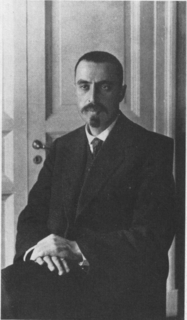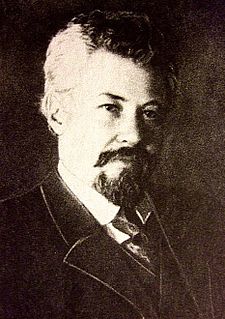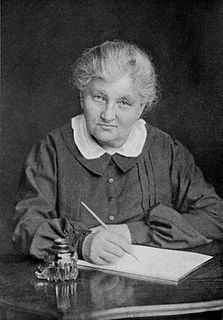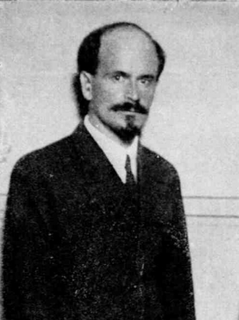The Siberian Zimmerwaldists were a political grouping which emerged in 1915 in Siberia amongst political exiles in Irkutsk. The Siberian Zimmerwaldists got their name from the Zimmerwald Conference, though they existed as a cohesive group prior to that conference, which occurred in September 1915. The exact origins of the name are unclear, though Rex A. Wade suggests it may have been created by Nikolai Sukhanov. [1] They consisted of two principal currents: social democrats—whether Bolshevik, Menshevik, or unaligned—and Internationalist Socialist Revolutionaries grouped around Avram Gots. [2] Irakli Tsereteli, a Georgian Social Democrat exiled in Siberia, took up a leading role within the movement, editing the journal produced by the group and serving as a mentor for several of the members. [3]

Siberia is an extensive geographical region spanning much of Eurasia and North Asia. Siberia has historically been a part of modern Russia since the 17th century.

Irkutsk is the administrative center of Irkutsk Oblast, Russia, and one of the largest cities in Siberia.

The Zimmerwald Conference was held in Zimmerwald, Switzerland, from 5 to 8 September 1915. It was the first of three international socialist conferences convened by anti-militarist socialist parties from countries that were originally neutral during World War I. The individuals and organizations participating in this and subsequent conferences held at Kienthal and Stockholm are known jointly as the Zimmerwald movement.
At its heart Siberian Zimmerwaldism was based on the ideals of the branch of socialists who were opposed to the war and wanted to restore the Second International, which had fractured upon the outbreak of the war as the various socialist groups differed on policy towards the war: many had abandoned the International in favour of defence of their countries (the so-called "Majority"), while the "Minority" was split between the extreme left (led by Vladimir Lenin), which advocated class warfare, and the more mainstream view that sought to use the International; as such they were known as the "Internationalists", to which the Siberian Zimmerwaldists were related. [4]

Vladimir Ilyich Ulyanov, better known by his alias Lenin, was a Russian revolutionary, politician, and political theorist. He served as head of government of Soviet Russia from 1917 to 1922 and of the Soviet Union from 1922 to 1924. Under his administration, Russia and then the wider Soviet Union became a one-party communist state governed by the Russian Communist Party. Ideologically a communist, he developed a variant of Marxism known as Leninism; his ideas were posthumously codified as Marxism–Leninism.

Irakli Tsereteli was a Georgian politician and a leading spokesman of the Social Democratic Party of Georgia and later Russian Social Democratic Labour Party (RSDLP) during the era of the Russian Revolutions.
Alfred Rosmer was an American-born French political activist and historian. Rosmer is best remembered as a political associate of Leon Trotsky and a memoirist.

Elections to the All-Russian Constituent Assembly were held on 25 November 1917, around 2 months after they were originally meant to occur, having been organized as a result of events in the Russian Revolution of 1917. They are generally recognised to be the first free elections in Russian history.

Catherine Breshkovsky. A major figure in the Russian socialist movement, a Narodnik and later one of the founders of the Socialist Revolutionary Party. She spent over four decades in prison and Siberian exile for peaceful opposition to Tsarism, acquiring, in her latter years, international stature as a political prisoner. Also popularly known as Babushka, the grandmother of the Russian Revolution.

The Social Democracy of the Kingdom of Poland and Lithuania, originally the Social Democracy of the Kingdom of Poland (SDKP), was a Marxist political party founded in 1893. It later merged into the Communist Workers Party of Poland. Its most famous member was Rosa Luxemburg.

Mark Andreyevich Natanson was a Russian-Jewish revolutionary and one of the founders of the Circle of Tchaikovsky, Land and Liberty, and the Socialist-Revolutionary Party. In 1917, he was a leader of the Left Socialist-Revolutionaries, supporting the Bolsheviks in the October Revolution. He was the uncle of Alexander Berkman.
Social patriotism is an openly patriotic standpoint which combines patriotism with socialism. It was first identified at the outset of the First World War when a majority of Social Democrats opted to support the war efforts of their respective governments and abandoned socialist internationalism and worker solidarity.

Vadim Viktorovich Rudnev was a Russian politician and editor.

Avram Rafailovich Gots was a Russian Socialist-Revolutionary leader, active in the Revolutions of 1905 and 1917.
The Kienthal Conference was held, in the Swiss village of Kienthal, between April 24 and 30, 1916. Like its 1915 predecessor, the Zimmerwald Conference, it was an international conference of socialists who opposed the First World War.
Internationalist and defencist were the broad opposing camps in the international socialist movement during and shortly after the First World War. Prior to 1914, anti-militarism had been an article of faith among most European socialist parties. Leaders of the Second International had even suggested that socialist workers might foil a declaration of war by means of a general strike.
The Third Zimmerwald Conference or the Stockholm Conference of 1917 was the third and final of the anti-war socialist conferences that had included Zimmerwald (1915) and Kienthal (1916). It was held in Stockholm on September 5–12, 1917.

Internationalism is a political principle which transcends nationalism and advocates a greater political or economic cooperation among nations and people.
The International Socialist Commission, also known as the International Socialist Committee or the Berne International was a coordinating committee of socialists parties that adhered to the idea of the Zimmerwald Conference of 1915.

Julius Martov or L. Martov was a politician and revolutionary who became the leader of the Mensheviks in early 20th-century Russia. He was an old friend and mentor of Leon Trotsky, who described him as the "Hamlet of Democratic Socialism". Vladimir Lenin, his longtime political opponent, confessed in 1921 that his single greatest regret was "that Martov is not with us. What an amazing comrade he is, what a pure man!" According to his sister and fellow Menshevik, Lydia Dan, Martov had an "inexhaustible charm that attracted people". As a result, some commented it was frequently difficult to record why they followed him, and he confessed that "I have the nasty privilege of being liked by people".
The Mensheviks were a faction in the Russian socialist movement, the other being the Bolsheviks.

Proletarian internationalism, sometimes referred to as international socialism, is the perception of all communist revolutions as being part of a single global class struggle rather than separate localized events. It is based on the theory that capitalism is a world-system and therefore the working classes of all nations must act in concert if they are to replace it with communism. Proponents of proletarian internationalism often argued that the objectives of a given revolution should be global rather than local in scope—for example, triggering or perpetuating revolutions elsewhere.
The Menshevik-Internationalists was a faction inside the Russian Social Democratic Labour Party (Mensheviks). The faction, representing the left-wing inside the party, emerged in May 1917. It was joined by a number of political leaders returning from exile, the most notable being Julius Martov. The Menshevik-Internationalist opposed the pro-war line of Dan and Tsereli. The Menshevik-Internationalists hoped to sway the Menshevik Party over to an anti-war stance. The Menshevik-Internationalists dominated the Menshevik Party Organizations in Kharkov, Tula and some other places. They had some control over the Petrograd branch of the party.

The Steppes electoral district was a constituency created for the Russian Constituent Assembly election, 1917. The electoral district covered the Akmolinsk Oblast and the Semipalatinsk Oblast. According to Wade (2004), it is unclear whether the election was carried through to completion in the electoral district.















